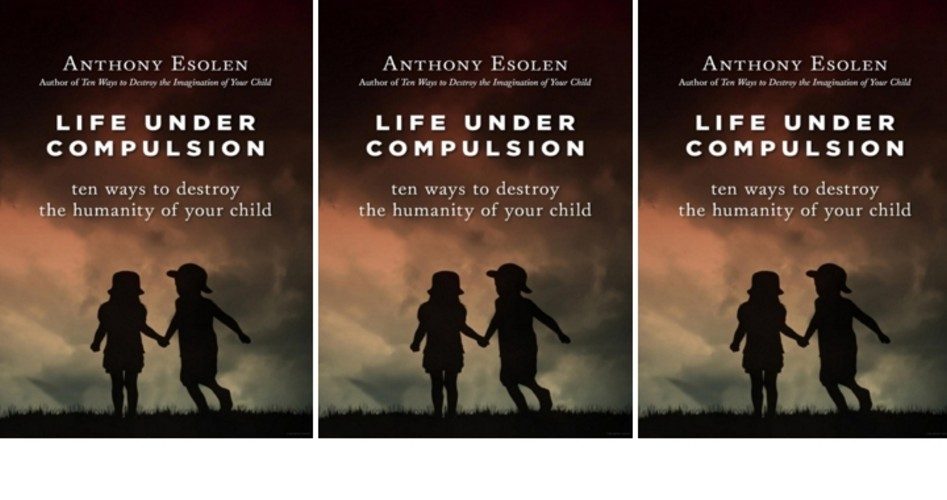
Anthony Esolen’s new book, Life Under Compulsion: Ten Ways to Destroy the Humanity of Your Child, builds on his previous book, Ten Ways to Destroy the Imagination of Your Child. The theme of the book is thus one of the greatest breadth and pressing significance, and the author’s treatment of the topic will give a reader much to consider regarding the path that has led our civilization to its current spiritual impoverishment.
Throughout Life Under Compulsion, Esolen’s style bespeaks his status as a professor of English at Providence College: the text is replete with citations drawn from across the expanse of Western literature from the ancient Greeks to the modern day. However, the author’s love for Dante, in particular, is manifest time and again as he returns to imagery from the Florentine’s Divine Comedy to flesh out the failings of our modern age. And, there is much to be gathered from Dante’s Inferno when considering the compulsions that drive the descent of this age, as Esolen makes explicit as he defines the parameters for his book:
The compulsions that are enslaving so many of our children are of two kinds. Some compulsions come from without: government mandates that determine what children are taught, how they are taught, and even what they can eat in school….
There is a second kind of compulsion, the kind that comes from within: the itches that must be scratched, the passions by which children (like the rest of us) can be mastered. Spiritual compulsion is not the same thing as habit. It is not so much what the soul possesses as what possesses the soul. Compulsion is to a natural habit as lust is to love. The wretched souls in Dante’s Inferno, when the boatman Charon tells them where they are going, curse God and their parents and the whole human race and the place and time of their begetting and their birth.
Throughout Life Under Compulsion, the dominance of a mentality of mass-manufacture seems inextricably linked by Esolen with the compulsive character of modern culture. In this sense, Esolen’s book seems to look back on a process that Garet Garrett sketched out in his Ouroboros, or the Mechanical Extension of Mankind, first published in 1926. Compulsory education in schools that bear more resemblance to factories than academies is inextricably linked in Esolen’s writing to the compulsive evils of this age, and even the means of conveyance to such factory schools reinforces the compulsory character of the institution: “The school bus and the school warehouse go together. The latter requires the former. The school bus and the school as an institution set over against the family and family loyalties also go together. The former made possible the latter.” The school itself he describes in mechanistic terms: the Teaching Machine.
The salesmen of the Teaching Machine, aware that children who are whisked out of their control usually learn quite a lot that is never taught within the Machine, fall back upon an impregnable defense. Then it is that we learn what the Machine is for. It is not for teaching children but for socializing them. Notice the ugly word, as if it were describing a chemical process for transforming worthless dross into something useful, like a rubber tire. Socializing evidently does not mean that the Teaching Machine imparts the difficult virtues of courage, temperance, prudence, and justice, much less such family-building and family-protecting virtues as manliness, womanliness, and chastity. Those virtues set people free. But we do not want a free people. Free people are not predictable. We want a managed people.
For Esolen, modern schools do not liberate (or even educate) young minds; rather, they shackle them, burdening children with slavery to their base desires even as they systemically rob them of a capacity for reflection on that which is encountered in school. Even as the children are denied an education, they are propagandized to believe that they are the wisest, most educated generation in human history:
I have often wondered at one of the most peculiar features of our self-styled progressive thought, which is that we take comfort from running down our ancestors. We wish to believe the worst about them and are disappointed or even enraged if someone should suggest to us that our great-grandfathers actually may have loved their wives and, on the whole, gotten along quite well with them, or that children not so long ago could leave school after about eight years, ready to do good works in the world and possessing a surer sense of the English language, of the history of the world and their nation, and of practical mathematics, than most of our young people possess when they graduate from high school. It cannot be so! It must not be so.
Esolen sets forth a mechanistic process whereby the young are taught a contempt for received tradition and a disdain for Church and Home, and the harmony of a life lived before the hearth and the altar. “In a good home, a true home, people do not merely eat and sleep, or pursue their private interests behind closed doors; they dwell with one another and for one another. A home is like a church, as G. K. Chesterton would put it: bigger on the inside than on the outside. The farther you fly, comet-like, from the gravitational pull of home, the more you must submit to all the arbitrary edicts of the social machine.” Ultimately, Esolen’s book is a call for repentance that would see men and women return to the sanctified ways of life now nearly forgotten.
There is much to commend Esolen’s Life Under Compulsion; sadly, however, it is utterly lacking any footnoting for the extensive citations from various literary sources that are invoked throughout this work. Also, there is a certain unevenness to the writing, which left this reader with the sense that the author engaged a bit too much in a piecing together of previously-extant articles that, in time, became portions of this book. That being said, Esolen’s work is often evocative of other eloquent critics of our culture; for example, this reviewer often called to mind Gene Veith’s works on similar topics while reading Life Under Compulsion. In time, Esolen may reach a similar depth of insight into our current sad state of affairs in the West; his current work will certainly give readers the opportunity to critically review their own outlook, and to seek a reformation of our mangled institutions while there is still time.
Anthony Esolen, Life Under Compulsion: Ten Ways to Destroy the Humanity of Your Child, Wilmington, Delaware: ISI Books, 2015, hardcover, 222 pages.



